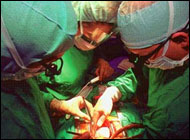Music Quiets Pain After Surgery
Medication is the best, first choice to treat pain following surgery, but music may be a good complement to pain-relief drugs, according to a new review of clinical studies.
Patients who listened to music after surgery reported less pain than other patients who were not exposed to music, the review found. Music also reduced the patients’ need for morphine-like drugs.
Lowering a patient’s need for narcotics following a surgical procedure cuts the risk for drug complications like nausea and vomiting. But the review suggests that music’s pain-relieving benefits are too small to result in fewer drug-related side effects, said lead reviewer M. Soledad Cepeda, M.D.
But even if music provides minimal pain relief, it may be worth trying, because it is non-invasive and inexpensive, said Cepeda, a professor at Javeriana University School of Medicine in Bogota, Colombia, and a faculty member of the anesthesia department at Tufts-New England Medical Center.
The review appears in the current issue of The Cochrane Library, a publication of The Cochrane Collaboration, an international organization that evaluates research in all aspects of health care. Systematic reviews draw evidence-based conclusions about medical practice after considering both the content and quality of existing trials on a topic.
“Before we didn’t know if music worked,” Cepeda said. “Now we know at least for acute postoperative pain that music decreases analgesic requirements and decreases pain intensity.” Music is another tool pain specialists can add to their kit of pain-relieving resources, she said.
The Cochrane reviewers culled results from 14 studies in which 489 surgery patients listened to prerecorded music. The benefits of music therapy were about the same for participants allowed to choose their own music and those who did not, the review said.
When postoperative patients rated their pain intensity, the largest difference in pain-reduction between the music and non-music groups was 0.9, on a scale of zero to 10. Significant, but small, Cepeda said.
In addition to absolute pain ratings, four of the 14 studies asked patients about their degree of pain relief. When reviewers analyzed that data, they found that five patients would have to be treated with music to see a reduction in pain and a decrease in analgesic requirements in one person. In comparison, three patients would have to be treated with morphine-like drugs to see pain relief in one, Cepeda said.  “Even though that five for music looks really close to morphine’s three, we are less confident about that result because you have fewer studies reporting that outcome,” she said.
“Even though that five for music looks really close to morphine’s three, we are less confident about that result because you have fewer studies reporting that outcome,” she said.
Again using the limited results from the four studies, Cepeda’s team estimated that music has the same effect as about 325 milligrams of acetaminophen (Tylenol). An over-the-counter, adult dose of regular-strength acetaminophen is two 325 mg tablets.
Science hasn’t uncovered the mechanism behind music’s pain-relieving benefits, but distraction or relaxation may contribute to the analgesia. Music therapy researcher Ruth McCaffrey said patients say music gives them a sense of control during a regimented, in-hospital recuperation.
“Especially in postperative pain, the patient may not be in control of getting their pain medication,” said McCaffrey, an assistant professor in the nursing school at Florida Atlantic University, who was not involved in the Cochrane review.
“They may have to push a button and wait for the nurse to come,” she said. “If they can use the music while they are waiting it may reduce the anxiety, of ‘When is my pain medication coming?’”
The Cochrane review analyzed a total of 51 trials testing music’s effect on pain, but other study results were not consistent enough to conclude whether music relieves other kinds pain associated with cancer, childbirth and labor or discomfort during diagnostic procedures.
Cepeda MS, et al. Music for pain relief. The Cochrane Database of Systematic Reviews 2006, Issue 2.
www.cochrane.org
Revision date: July 4, 2011
Last revised: by Tatiana Kuznetsova, D.M.D.